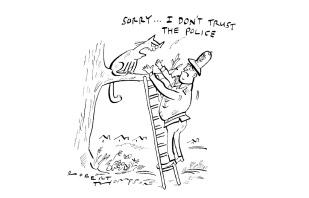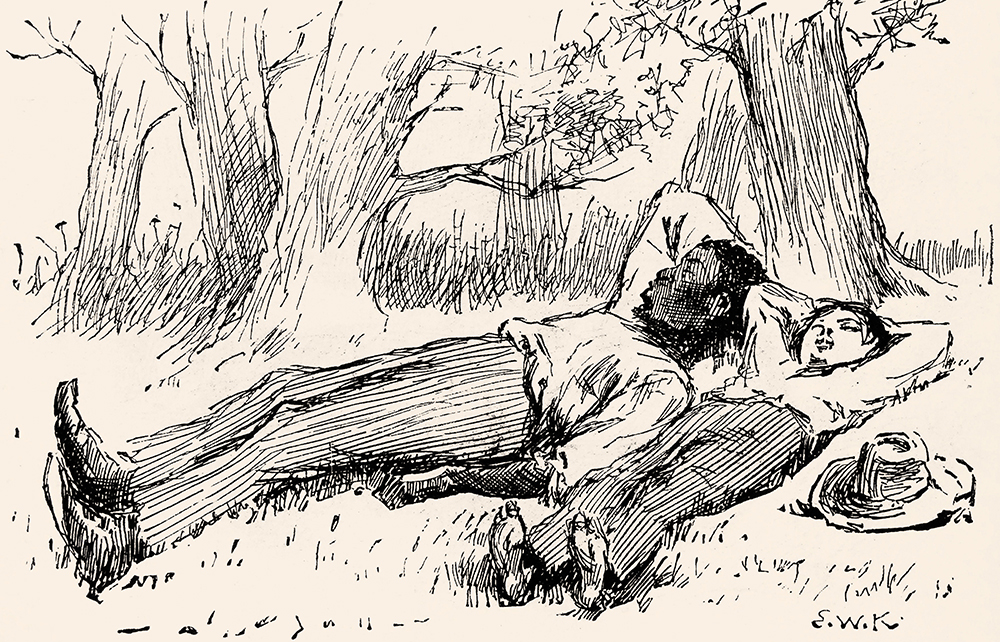Rereading The Adventures of Huckle-berry Finn can be a saddening experience. It’s not just the oft-repeated n-word that jolts, then pains, then twinges; it’s the ‘no sah’, ‘I’s agwyne to’ locutions of Huck’s companion, the runaway slave Jim. In retelling the celebrated adventure story in Jim’s own voice, Percival Everett upends the convention. James and his fellow slaves can speak perfectly good English between themselves. It’s only when white folks are around that they perform blackness. Whether two slaves out of the earshot of whites would discuss if a situation represents ‘an example of proleptic irony or dramatic irony’ is another matter.
Huck Finn is one of the great voices in all literature – coarse, honest, bewildered, innocent, moral, and hilarious without intending to be. Everett doesn’t even try to reflect this in a narrative that’s more about action and anger than atmosphere. He couldn’t in any case rival the knowledge of the Mississippi of the man who took his pen-name from a river pilot’s cry. When a steamboat smashes the pair’s raft, Huck says: ‘I dived – and I aimed to find the bottom, too, for a 30ft wheel had got to go over me, and I wanted it to have plenty of room.’ No point touching up a passage like that.
In Huckleberry, Jim and other slaves are superstitious and gullible, easy to tease and amaze. In James, this is another pretence; white people must always be made to feel intellectually superior. The novel is plotted fairly tightly on the original text, but during their journey downriver the two fugitives are separated several times. It’s when filling in these episodes that Everett’s retelling comes alive.
Though we lose, for example, the shocking murder of Boggs by Colonel Sherburn, witnessed by Huck alone, Everett has James fall in with a troupe of minstrels. This leads to the almost Shakespearean paradox of a black man blacking up so as to appear to be a white man playing a negro. Everett displays two discrete worlds, white and black, touching only at a thin, occasionally porous membrane. His hero is helped along the way by fellow slaves, an assistance as readily offered as it is potentially fatal. Slaves are penned like animals. From the time of her birth, 15-year-old Sammy ‘was never 20 yards’ from her place of work. Everett can also detail the rapes Mark Twain could never have hinted at. James is frequently terrified as he makes his way by night pursued by dogs and posses. It’s not the fear of a coward, but the existential dread of someone navigating an utterly malign universe.
Where Twain leavened his savage indignation with broad humour, Everett’s story is more pitiless. The prating con artists the ‘King’ and the ‘Duke of Bridgewater’, enjoyable frauds in Huckleberry, here become villains, administering a brutal beating that leaves James debilitated. This skews one of the finest moments in the original when the disgraceful pair are finally caught, tarred and feathered, and Huck is appalled at their fate: ‘I was sorry for them poor pitiful rascals, it seemed like I couldn’t ever feel any hardness against them any more in the world. It was a dreadful thing to see.’ In Huckleberry it is the whites – Huck’s ‘Pap’, the Colonel – who are threatened with lynching. In contrast, Everett makes it very clear who bore the brunt in a generally violent society. No black man could ever dream of disarming a mob the way the Colonel does.

In a novel preoccupied with ‘passing’, James encounters Norman, light-skinned enough to be taken for white. James is intrigued that he doesn’t wish to live as a white person full time. ‘I don’t want to be one of them,’ Norman says flatly. Ever resourceful, James plans for Norman to sell him repeatedly, with James running away to reunite with Norman and play the trick again. But James also encounters a strange species – the slave who is happy to be a slave and may at any moment betray the runaway to his master.
Which brings us to the weirdest passage in the original, where Jim is kept prisoner in a shed while the egregious Tom Sawyer endlessly delays freeing him because it has to be done ‘in the right way’ – i.e. according to the adventure stories Tom is addicted to. Tom and Huck torment Jim with needless rope ladders, anonymous messages and implements with which to carve a coat of arms on the wall. Wisely, Everett skips the whole episode. The Jim-Huck relationship, so moving and tender, is given a gloss that entirely changes its nature, not for the better in my view. But in a final flourish, James is the one who frees Huck – who is going to ‘light out for the Territory’ – from the narrative, because James has urgent business of his own to complete.







Comments